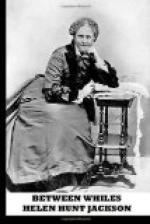It was only the third morning of Willan’s stay at the inn; but the time had been put to very good use. Already it had become natural to him to come and go with Victorine,—to stay where she was, to seek her if she were missing. Already he had learned the way up the outside staircase to the platform where she kept her flowers and sometimes sat. He was living in a dream,—going the way of all men, head-long, blindfold, into a life of which he knew and could know nothing.
“Indeed, and that is what I should like best of all things,” he replied to Victorine. “Will thy aunt let thee go?”
“Why not?” asked Victorine, opening her eyes wide in astonishment. “I ride all over the parish on my pony alone.”
“Stupid of me!” ejaculated Willan, inwardly: “as if these people could know any scruples about etiquette!”
“These people,” as Willan contemptuously called them, stood at the door of the inn, and watched him riding away with Victorine with hardly disguised exultation. Not till the riders were fairly out of sight did Victor venture to turn his face toward Jeanne’s. Then, bursting into a loud laugh, he clapped Jeanne on the shoulder, and said: “We’ll see thee grandmother of thy husband’s grandchildren yet, Jeanne. Ha! ha!”
Jeanne flushed. She was not without a sense of shame. Her love for Victorine made her sensitive to the stain on her birth.
“Thinkest thou it could ever be known?” she asked anxiously.
“Never,” replied her father,—“never; ’tis as safe as if we were all dead. And for that, the living are safer than the dead, if there be tight enough lock on their mouths.”
“He doth seem to be as much in love as one need,” said Jeanne.
“Ay,” said Victor, “more than ever his father was with thee.”
“Canst thou not let that alone?” said Jeanne, angrily. “Surely it is long enough gone by, and small profit came of it.”
“Not so, not so, daughter,” replied Victor, soothingly; “if we can but set the girl in thy shoes, thou didst not wear thine for nought, even though they pinched thee for a time.”
“That they did,” retorted Jeanne; “it gives me a cramp now but to remember them.”
Willan and Victorine galloped merrily along the river road. The woods were sweet with spring fragrances; great thickets of dogwood trees were white with flowers; mossy hillocks along the roadside were pink with the dainty bells of the Linnaea. The road was little more than a woodman’s path, and curved now right, now left, in seeming caprice; now forded a stream, now came out into a cleared field, again plunged back into dense groves of larch and pine.
“Never knew I that the woods were so beautiful thus early in the year,” said the honest Willan.
“Nor I, till to-day,” said the artful Victorine, who knew well enough what Willan did not know himself.
“Dost thou ride here alone?” asked Willan. “It is a wild place for thee to be alone.”




